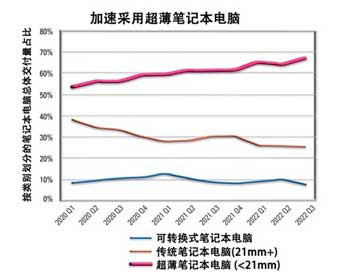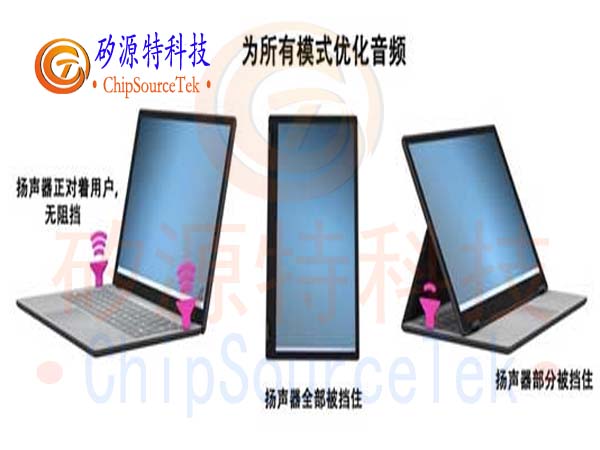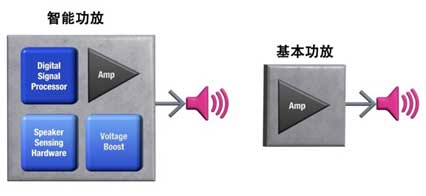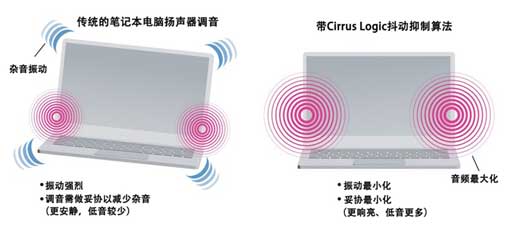Today‘s ultra-thin laptops are used in various ways and conditions, but they all require consistent high-quality audio. This means that the speakers in these ultra-thin laptops must be smaller and thinner. However, physical limitations make it difficult to obtain loud sound and sufficient low-frequency from these miniature speakers. The audio should also be consistent across all different usage scenarios. The constantly changing location and environment may greatly affect the audio consistency of laptops. For example, users can choose to listen to a two in one device in tablet mode, tent mode, or laptop mode, as shown in Figure 4. In addition, low battery power can limit the loudness of the audio. Other use cases that affect the consistency of laptop audio quality include different volume levels and audio content types, such as voice, movies, music, and games. Finally, the audio quality should remain stable over time without significant speaker performance degradation or malfunctions. Each of these application scenarios has different acoustic and electrical challenges.
Figure 3: Cirrus Logic supports fine-tuning sound effects for each mode and adapting to different acoustic effects, ensuring consistent loudness and high-quality audio for laptop, tablet, and tent mode application scenarios.
The demand for high-quality speaker audio has prompted OEMs to prioritize smart amplifiers as their preferred technology. Intelligent amplifier technology extracts the best audio performance from the highly challenging acoustic design of laptops. In order to obtain high-quality audio output signals, the design of laptops must have full bass, low distortion, balanced sound, and limited noise and vibration. Intelligent power amplifiers integrate software and hardware to maximize loudness, quality, and consistency, while minimizing noise and protecting speakers from damage.
However, driving the speaker to maximum loudness is a delicate balance. If driven too much, the speaker may experience distortion or even permanent damage. Turning up the volume can also cause noise from speakers, keyboards, chassis, or other components. Users view this noise as distortion and may feel unwanted vibrations. In the worst-case scenario, manufacturers reduce the volume to prevent noise, but this can damage the soundness, loudness, quality, and consistency of the audio, thereby affecting the overall experience of watching movies or playing games.
The biggest challenge is to ensure that an ultra-thin laptop can maintain good sound quality for different purposes and conditions. The audio signal must sound consistent for different content types (such as voice, music, and games), as well as at different volumes and battery levels. Over time, the audio quality of these devices should remain consistent without significant speaker performance degradation or malfunctions.
DSP intelligent power amplifier solves the problem of loudness
The intelligent power amplifier (Figure 4) solves these challenges by combining the amplifier with an integrated digital signal processor (DSP), which runs intelligent algorithms with speaker physical models to maximize speaker performance and consistency. The combination of this processor and speaker state sensing hardware allows the amplifier to more forcefully push the speaker while protecting it from damage.
Compared to basic power amplifiers, intelligent power amplifiers can achieve twice or more sound pressure levels (SPL). In addition, OEMs are overcoming loudness limitations through new cutting-edge speaker types aimed at extracting better audio, including large amplitude and force cancellation speakers. These new speakers require intelligent amplifiers with high driving strength to achieve optimal performance.
Figure 4: High quality audio requires intelligent amplifiers with high driving strength to achieve maximum audio loudness and performance.
Maintain high quality
Everyone has a different definition of sound quality. But overall, issues of general concern include loudness, low distortion, balanced response, transparency, and less noise. Intelligent amplifiers help drive micro speakers to the limit of the bass range, and in many cases, they can expand the frequency range to achieve deeper bass. When there is no single frequency range (such as bass, midrange, or treble) dominant, a balanced or "flat" response may occur. Implementing this strategy through on-chip algorithms can produce more pleasant sounds.
Low distortion helps improve clarity and comprehensibility, especially for voice calls. The enhancement algorithm helps balance the speaker response by measuring the frequency response of the speaker to eliminate any unnecessary peaks or valleys.
As shown in Figure 5, noise is a dynamic and challenging audio issue. Certain specific content such as ringtones and vocals may cause noise, while other content such as pop music may not trigger noise. When the speaker vibrates, it will cause a chain reaction, and other parts of the system (such as the keyboard or chassis) will emit noise. Unneeded vibration is a terrible experience, and users may even view noise as audio distortion, which can damage clarity and comprehensibility.
Figure 5: The Cirrus Logic algorithm can reduce noise and minimize vibration in ultra-thin laptops while ensuring loud and high-quality audio.
Cirrus Logic intelligent power amplifiers with on-chip signal processing capabilities can achieve higher quality through enhanced algorithms. The dynamic bass expansion algorithm can maximize the loudness and depth of bass at any volume level. Quick tuning and adaptation functions can optimize the sound quality of each different product form, such as tablet, tent, or laptop modes. Finally, the battery management algorithm adjusts tuning parameters when the battery voltage drops to maximize loudness and reduce distortion.
Intelligent Power Amplifiers Drive Laptop Audio to the Future
With the increasing demand for mobility and remote work over the past decade, laptop audio has become a part of our lives and work. Reducing the size of laptops significantly to ultra-thin, lightweight, and flexible product forms makes the audio challenges in remote and mobile user environments more complex. The latest and most innovative laptops utilize intelligent amplifiers to fully leverage their design advantages and provide consumers with a stunning sound experience. Despite the demanding demands of today‘s mobile user environment, intelligent amplifiers using advanced algorithms can provide excellent audio quality through multiple speakers, providing an immersive audio experience for movies, music, games, and voice.
|
Disclaimer: This article is transferred from other platforms and does not represent the views and positions of this site. If there is any infringement or objection, please contact us to delete it. thank you!
中恒科技ChipHomeTek
|





